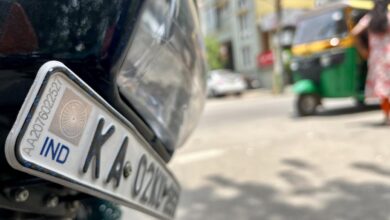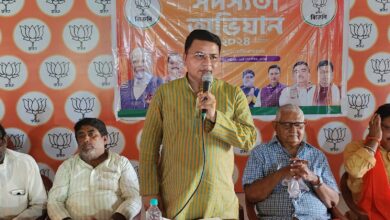Rajshri Deshpande on being ‘an activist actor’, not doing films for money and fighting stereotypes: ‘Would only get offered gangster’s wife or intimate parts’ | Bollywood News
When the Netflix global hit Sacred Games dropped as the streaming giant’s debut India Original in 2018, it put everyone on the map. The audience was in awe of what Anurag Kashyap-Vikramaditya Motwane had helmed with Nawazuddin Siddiqui and Saif Ali Khan in the lead and within that audience, closer home, was a section which discovered who actor Rajshri Deshpande was.
The crime-thriller series brought Rajshri acclaim as Subhadra, wife of Nawazuddin’s Gaitonde, but what it also led to was nasty virality, where out-of-context intimate clips from the series started crowding the internet. While all of this was peaking, Rajshri Deshpande was busy doing something which the same audience would find out about her personality later: building a school.
“I wasn’t affected by it all,” she tells SCREEN as recalls the phase. “I knew building the school was far more important and I told people in the village the same thing– focus on ground, all is noise,” she added with a laughter.
In an interview with SCREEN, Rajshri Deshpande–who has in recent years upped the game with works like Trial by Fire, The Fame Game and her latest Gujarat riots-based short film Gugudi by filmmaker Abhiroop Basu–charts her journey; from forgettable cameos in Salman Khan’s Kick and Aamir Khan’s Talaash, to memorable screen work which has made her a credible voice in the industry, although not without her major challenges.
Edited excerpt:
 Rajshri Deshpande first gained recognition with Angry Indian Goddesses. (Photo: Shivaji Storm Sen, Rajshri Deshpande/Instagram)
Rajshri Deshpande first gained recognition with Angry Indian Goddesses. (Photo: Shivaji Storm Sen, Rajshri Deshpande/Instagram)
Was there something you were told about survival when you joined the film industry?

I left a high paying corporate job and moved to Mumbai. In my early 20s, I would think money would give me happiness and then I struggled to get out of that thinking because it had stopped giving me happiness. It took away my life. In my 20s, I would dress like a 40-year-old, behave like an elderly person, which was wrong. That age, I should have travelled, partied, done theatre, but I didn’t. I just wanted to make money and buy things for my parents, support my family. That’s because I saw my mother struggle a lot.
When I moved here, I had enough money to survive, so I was absolutely fearless. So, I did small roles in films like Salman Khan’s Kick, Aamir Khan’s Talaash, did some TV shows as well. But it wasn’t my calling, so I stopped that, because there was no growth. Then I travelled, enrolled in some classes for self-development. Acting wasn’t my dream– freedom was. There were no goals that I want to achieve this or that.
Watch: Taapsee Pannu-Kanika Dhillon on cinema & criticism: ‘Most heroes still decide their heroine’
Do you remember how much were you paid for Kick and Talaash?
I did get good money for both, I just had one scene. It was funny because Salman Khan couldn’t turn up for shoot, so I get paid for one day extra! I don’t even remember if my scene is still there. I thought those big sets were boring, because you are such a tIny person there, no one knows you, nobody is paying attention to you. You are one of the junior artistes there, and I didn’t feel bad then, nor will I feel hurt today. It is not like I want some special treatment, but people look at me differently.
Did you fear losing out though?
Never, I have said no to so many ads which don’t align with me. There was one shoot where a six-year-old child was filming with me and after 14 long hours, he was so exhausted he started crying. I requested them to do the rest later, I will do it for free, but they convinced the parents by paying them extra. But it was a wrong thing to do. After that, they never called me. The moment you say something you get blacklisted.
Are you called ‘difficult’?
No, because there is a lot of love and respect, I get. I do like to stand up for things. We were shooting for a film, and they had two vanity vans for two actors, including me. There were a few girls in the costume department, and they had to walk three kilometers for the washroom. How was that even possible? I put my foot down, said they will have one vanity van. But if you say this out aloud, they will call you whatever. You do have to stand up for the right reason.
How was the phase of Angry Indian Goddesses, Sacred Games and Manto for you?
My parents were happy that my work was coming out, but I didn’t realise what was happening, especially when Sacred Games blew up. I was in the village, working on my school, solving a crisis there. It was around that time when the madness of Sacred Games was peaking with videos of mine from the show being circulated on WhatsApp. I wasn’t affected, I knew building the school was far more important and told people in the village the same thing, ki waha mat dhyan do, ye zaroori hai.. My attention was there more. And not like some great roles were coming my way then.
There was a gap of two years after Sacred Games, were you refusing work?
I was in the village at that time and the roles which were coming were clones of Sacred Games. Either it was the wife of a gangster or something to do with intimacy. I remember getting some casting calls where I was told, ‘Mam this has just two sex scenes, that shouldn’t be a problem for you.’ This is how they’d talk.
Another problem here is that the more popular you are in terms of social media trends, people will pay attention to that. You will have very often paying attention to other kind of cinema and what people are doing there. A film works because of the entire ensemble, Trail by Fire reached out to many because it had a fantastic cast and an amazing team.
But if a film comes your way, with not the best of scripts but good money, won’t that be tempting?
I have said no to films even when I had no work and little money. What exactly will I buy with that money? I want money to travel, but I am not materialistic. I have seen what money did to me in my 20s, I don’t want to go back to that depression. Everyone loves money, but it is difficult to handle it. I remember after Sacred Games people told me now, I should just cash in on the show and earn truckloads of money, go ballistic with my PR. But that’s not me.
Do you feel popular?
See there is a lot of respect, and I have worked hard to get here. It takes time to achieve this space, but the audience can see it. My ‘popularity’ is because of my social work as well as acting. Otherwise, some people think I am just an actor, some believe I am just an activist. A lot of times, when I go to do my social work, they feel I am an actor first whereas here in the industry, they feel I am an ‘activist kind of an actor.’ I am both and I keep these two separate.







